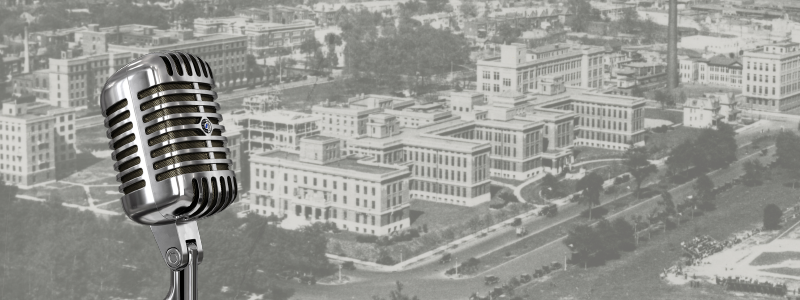
Washington University School of Medicine Oral Histories

Ann Armstrong-Dailey Oral History
Interviewer
Bryan Sisk MD, MSCI
Files
Download Interview Transcript [PDF] (157 KB)
Summary
Ann Armstrong-Dailey was interviewed by Brian Sisk on June 25, 2019 for approximately one hour and 25 minutes for the Pediatric Palliative Care Oral History Project.
Scope and Content
Ms. Ann Armstrong-Dailey begins her interview by describing some early pivotal moments in her life that led her to a career advocating for palliative care. She first describes the memory of her and her mother fleeing kamikaze pilots and German submarines in Pearl Harbor, Hawaii and how that was a formative moment in understanding the processing power and tenacity of children. She then describes the circumstances of her brother’s death and the lack of support she received as a transformational moment that empowered her to “audaciously” seek out the global leaders of the world and ask them ‘why isn’t there support for dying children?’ Ms. Armstrong-Dailey then recalls two stories of children that were dying in a hospital and were blocked from receiving hospice care but were desperate to connect and support their parents and families as they died. She describes the momentous effect those deaths had on her and the urgency she felt to find a way to support better family communication and policy protections in pediatric healthcare.
Ms. Armstrong-Dailey tells how she built a supportive network of international collaborators who wanted to do better for dying children. She also describes instances where she rallied with this network to push ideas, legislation, literature, and healthcare models. Ms. Armstrong-Dailey describes some of her work exploring and dismantling some of the resistance she felt by providers and families with education and quantitative research. She concludes the interview by describing her dream of working herself out of business by integrating palliative care seamlessly into standard medical operating procedures. She also advocates for the continuation of investigations on how healthcare can perform better in communication with patients, families, and each other.
Biographical Information: Interviewee
Ann Armstrong-Dailey, founder of Children’s Hospice International, has devoted a lifetime of service to creating policy protections and ensuring that all ill children may have access to palliative services as they need them. Ms. Armstrong-Dailey was born in San Francisco in 1940 and experienced the loss of her parents and a sibling through war and illness. When Ms. Armstrong-Dailey lost her brother at sea in 1969 during the Vietnam conflict, she found she had no support from healthcare or policy. This drove her to seek action and investigate thanatology globally. Ms. Armstrong-Dailey then began to travel abroad seeking ideas and successful models of palliative care for dying children; however she was met with provider resistance and closed doors. She then formed the Children’s Hospice International organization “out of sheer, unadulterated anger” so that there would at least be someone starting the policy work around patient and family advocacy for palliative services. Ms. Armstrong-Dailey describes her most important impact on the field of pediatric palliative care to be in awareness of the issue that children could have better care when critically ill. Ms. Armstrong-Dailey is still actively improving access to services for children with life-threatening conditions with Children’s Hospice International.
Biographical Information: Interviewer
Bryan Sisk, MD, MSCI is an Assistant Professor in Pediatric Hematology and Oncology and an Assistant Professor in General Medical Sciences as a member of the Bioethics Research Center at Washington University in St. Louis. He completed medical school at the Cleveland Clinic Lerner College of Medicine at Case Western Reserve University. He completed his clinical training at St. Louis Children’s Hospital and Washington University School of Medicine.
Dr. Sisk was a clinical fellow in pediatric hematology and oncology when he initiated this Pediatric Palliative Care Oral History Project. As a trainee, Dr. Sisk had a strong interest in palliative care, the approach to the suffering of children, and the history of medicine. Prior to initiating this project, Dr. Sisk performed an in-depth review of the development of pediatric palliative care as a discipline and philosophy. This research culminated in a publication entitled, “Response to Suffering of the Seriously Ill Child: A History of Palliative Care for Children” in the journal Pediatrics. However, this historical review was limited to textbooks and publications. It lacked the personal experience of caring for these children and inspiring the development of a new clinical discipline. Inspired by David Clark’s oral history of the adult hospice movement, Dr. Sisk began to plan this pediatric oral history project.
Of note, this collection of oral histories is incomplete, and many important figures have not (yet) been interviewed. Dr. Sisk’s goal is to continue adding to this collection create a rich repository of personal insights and wisdom from leaders who changed the field of pediatrics.
Interview Date
2019-06-25
Collection Identifier
OH154-S02
Length
Approximately one hour and 25 minutes.
Restrictions
Users wishing to publish (in whole, or in part) content taken from the audio or transcript of this oral history interview must request, sign, and return a Statement of Use form to the Becker Archives. For detailed information regarding publication and use of this oral history, contact the Becker Archives (arb@wusm.wustl.edu).
Recommended Citation
Ann Armstrong-Dailey Oral History, OH154-S02, Bernard Becker Medical Library Archives, Washington University in St. Louis.
Disclaimer
The Becker Archives provides access to this oral history interview as a record of the past. This interview reflects the attitudes, perspectives, and beliefs of the interview participants, which may reflect outdated, biased, and offensive views and opinions. The Becker Archives does not endorse the views expressed in this interview, which may contain materials offensive to some users.




Notes
Access to the audio recording for this oral history may be obtained via approval of the archivists at Becker Library. Contact the archives for more information (arb@wusm.wustl.edu).